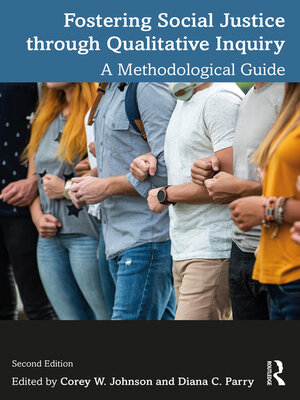Fostering Social Justice through Qualitative Inquiry
ebook ∣ A Methodological Guide
By Corey W. Johnson

Sign up to save your library
With an OverDrive account, you can save your favorite libraries for at-a-glance information about availability. Find out more about OverDrive accounts.
Find this title in Libby, the library reading app by OverDrive.



Search for a digital library with this title
Title found at these libraries:
| Loading... |
Contributor spotlight interviews:
Dr Kim Lopez: https://youtu.be/vEF71NM_jQc
Dr Jocelyn Scott: https://youtu.be/qfjcbgExEJ0
Dr Brian Kumm: https://www.youtube.com/watch?v=kchW0MDfw44&t=158s,
Dr Luc Cousineau: https://youtu.be/IjRvRw3WjgY
Now in its second edition, Fostering Social Justice through Qualitative Inquiry, addresses the methods of conducting qualitative research using a social justice paradigm. Qualitative researchers increasingly flock to social justice research to move beyond academic discourse and aid marginalized, oppressed, or less-powerful communities and groups.
The book addresses the differences that a social justice stance requires from the researcher, then discusses how major theories and qualitative methodologies are employed to create social justice in both the process and products of qualitative research. Snapshot theory chapters introduce the foundations of theories like feminism, critical race theory, queer theory, and many more. Robust methodological chapters cover grounded theory, phenomenology, ethnography, participatory action research, and other key qualitative designs. Chapters are written by experts in the specific theory or methodology, and exemplars of the authors work illustrate this style of research in action.
New to this edition:
This established textbook will be suitable for graduate students and scholars in qualitative inquiry in a range of disciplines, including Education and Gender and Sexuality, Communication, Leisure Studies, and across the social sciences.






